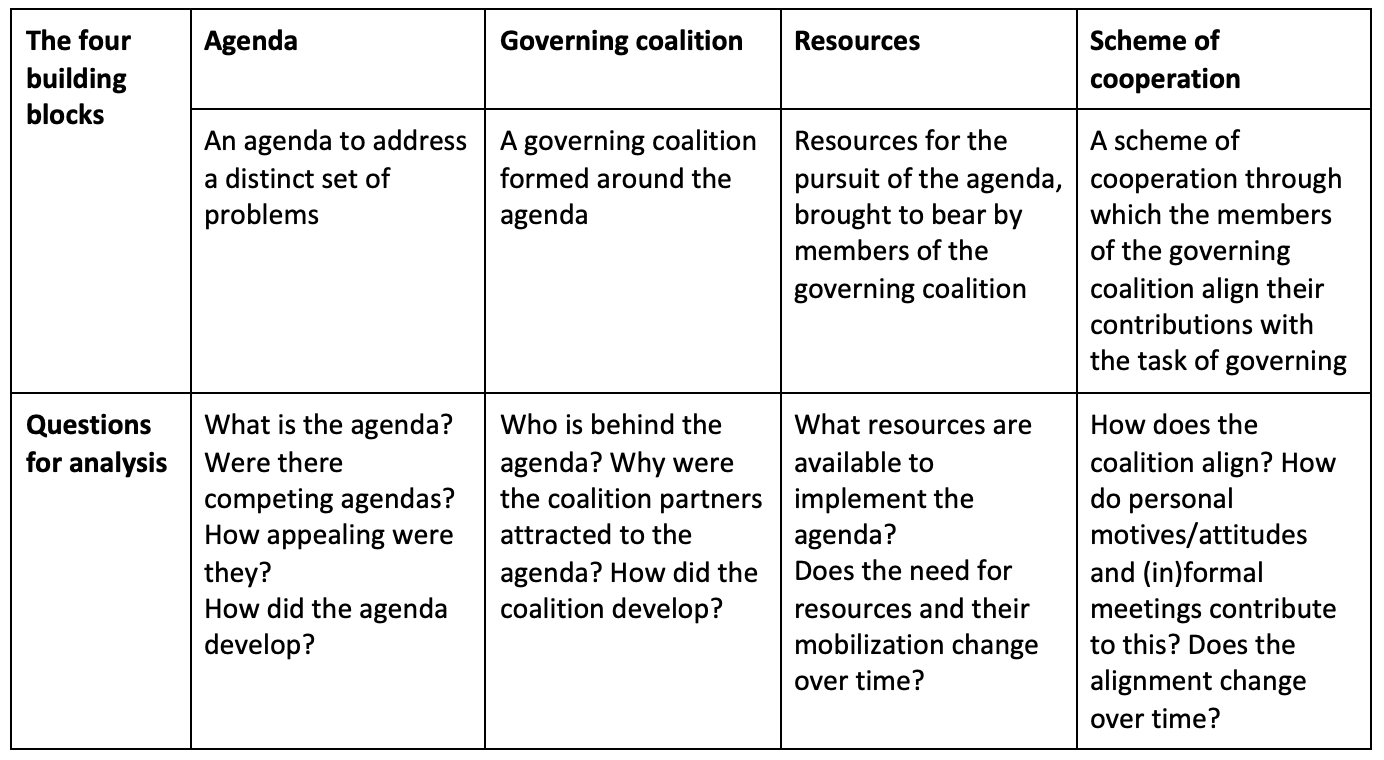Using the Urban Regime Framework to Learn from Urban Challenges
Julien van Ostaaijen (Tilburg University & Avans University of Applied Sciences)
In recent decades, developments related to globalization, immigration, the emergence of the post-industrial city, climate change, and the environment have posed challenges for cities all over the world. Scientists try to make sense of these developments and help cities cope with them. An increasingly appealing framework employed to understand and explain these challenges falls under the broad heading of “urban governance.” Despite its broad appeal (see Figure 1), urban governance has significant limitations as an analytic framework, especially when doing comparative research. By taking inspiration from the “urban regime” concept (Stone 1989; 2005), one can construct a better framework for comparative research into urban governance processes (see Table 1).
Figure 1. The number of publications including ‘urban governance’ in journals addressing urban or local affairs
The following journals were included in the search: Urban Affairs Review / Urban Affairs Quarterly (UAR), Journal of Urban Affairs (JUA), International Journal of Urban and Regional Research (IJURR), European Urban and Regional Studies (EURS), Local Government Studies (LGS), and Urban Research and Practice (URP).
Both the concepts of urban governance and urban regime “address the complex issue of urban collective action in the absence of formal authority, or with such authority as one of the collaborating partners rather than the locus of power and leadership over the collaboration” (Pierre 2014, 875). However, such broad qualifications leave room for interpretation. As an analytical tool to understand urban processes, the urban governance concept has been accused of being too vague. By contrast, the urban regime concept’s interpretation of a longstanding coalition focused on business participation is often construed as too narrow. As often, the solution lies in the middle. By taking inspiration from the urban regime concept, specifically its four ‘building blocks’ – agenda, coalition, resources, and scheme of cooperation – I construct a heuristic framework that can address and analyze urban governance processes with greater specificity. Table 1 illustrates how this heuristic framework could operate to understand and explain urban governance processes.
Table 1. The Urban Regime Framework and Main Questions for Analyses
By using the Urban Regime Framework, we can determine why (or why not) and how cities are able to cope with myriad challenges. For example, for a city that fails to enact school reform, this model could reveal how certain challenges, such as a resource deficit, competing political priorities, or weak coalition-building (drawing from Stone 2005, 331), each contributed to specific yet structural outcomes.
In an article recently published in Urban Affairs Review, I analyze three Dutch cases using the Urban Regime Framework. In each context, the authors describe the building blocks separately and seek answers to the questions posed in Table 1. In Table 2, I summarize their conclusions. To read more on the full analysis and findings, please see the complete article.
Table 2. Summary of the Urban Regime Framework Applied in Three Dutch Cases (Van Ostaaijen 2003)
Much work remains to be done. Apart from fine-tuning the framework, a significant number of detailed case studies will permit researchers to draw stronger conclusions about the ways in which urban governance works in different geographic and historical contexts. For example, more case studies may reveal what forms of coalitions fit certain governance challenges in specific cities and periods and why. These lessons will support professionals and practitioners in cities across the world to identify and implement more effective responses to the global and urban challenges they face.
Read the full UAR article here.
References
Van Ostaaijen, Julien. 2023. Agendas, Coalitions, Resources, and Schemes of Cooperation: Using the Urban Regime Framework to Study Processes of Urban Governance. Urban Affairs Review.
Pierre, Jon. 2014. "Can urban regimes travel in time and space? Urban regime theory, urban governance theory, and comparative urban politics." Urban Affairs Review 50 (6): 864 889.
Stone, C. N. (1989). Regime Politics: Governing Atlanta 1946-1988. Kansas: Lawrence University Press.
Stone, Clarence N. 2005. "Looking back to look forward: Reflections on urban regime analysis." Urban affairs review 40 (3): 309-341.
Julien van Ostaaijen is an assistant professor of Public Administration at the Department of Public Law and Governance at Tilburg University and a professor of Law and Safety at the Centre of Expertise Safe & Resilient Society at Avans University of Applied Sciences (both in the Netherlands). His research focuses on democracy, local politics, local parties, governance, sub-municipal units, and citizens’ participation.



